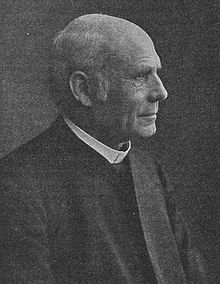Theodor Weber
Theodor Weber | |
|---|---|
 |
Theodor Hubert Weber (January 28, 1836, Zülpich, Rhine Province - January 12, 1906) was a German theologian and professor of philosophy.
Biography
Weber was born in Zülpich. He was the second bishop of the German Old Catholic Church, and one of the more important followers of Anton Günther's philosophy.
In 1858 he obtained his doctorate of philosophy at the University of Bonn under the tutelage of Franz Peter Knoodt (1811-1889). In 1860 he received his ordination in Breslau, and from 1862 to 1864 was a schoolteacher in the town of Sagan. In 1868 he received his habilitation, later serving as a professor of philosophy at the University of Breslau (1872 to 1890).
In 1890 he relocated to Bonn, where he was named vicar-general by Joseph Hubert Reinkens (1821-1896). In 1896 he succeeded Reinkens as bishop of the German Old Catholic Church.
Works
Among his better known writings are the following:
- Schülers Metaphysik. Anschauungen vom Menschen (Student metaphysics, views from the people), 1864
- Kants Dualismus von Geist und Natur aus dem Jahre 1766 und der des positiven Christentums (Kant's dualism of mind and nature from the year 1766 and positive Christianity), 1866
- Geschichte der neuen deutschen Philosophie (History of the new German philosophy), 1873
- Zur Kritik der Kantschen Erkenntnistheorie (Critique of Kantian epistemology), 1882.
- Metaphysik, eine wissenschaftliche Begründung der Ontologie des positiven Christentums (Metaphysics, rationale on the ontology of positive Christianity), (1888-91 two volumes)
Notes
This article includes a list of references, related reading, or external links, but its sources remain unclear because it lacks inline citations. (July 2014) |
References
- Zeno.org translated biography @ Eisler: Philosopher's Dictionary
External links
- . New International Encyclopedia. 1905.
- 1836 births
- 1906 deaths
- People from Zülpich
- German Old Catholics
- German Old Catholic bishops
- University of Breslau faculty
- People from the Rhine Province
- German Old Catholic theologians
- German male non-fiction writers
- 19th-century German theologians
- 19th-century German writers
- 20th-century German theologians
- 20th-century German writers
- German philosopher stubs
- German theologian stubs
